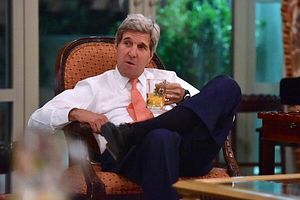When U.S. Secretary of State John Kerry landed in Kabul last week, most Afghanistan watchers (myself included) had little optimism that he would be able to resolve the impasse over allegations of fraud between the two contenders for the Afghan presidency. On the contrary, Kerry succeeded, and not just modestly — he managed to get both candidates to agree to a complete (time-consuming) audit of all eight million plus votes that were cast in the June 14 run-off election in Afghanistan. The two candidates additionally agreed to a national unity government.
Following a meeting with both Ghani and Abdullah, Kerry told the press, “Every single ballot that was cast will be audited.” That outcome had been considered unlikely, as neither Ghani nor Abdullah could agree on the precise extent to which an audit was necessary. After Kerry’s intervention, both candidates agreed to a comprehensive audit. Kerry also met with incumbent Afghan President Hamid Karzai, understanding that any solution that would involve the United States or the United Nations would require Karzai’s acquiescence. Although the relationship between the United States and Hamid Karzai has declined precipitously since 2009 and markedly more so in the recent year, Kerry maintains a working relationship with Karzai.
Following the deal, Jan Kubis, Special Representative of the U.N. Secretary-General for Afghanistan and head of the United Nations Assistance Mission in Afghanistan (UNAMA), wrote Karzai asking him to prepare for a late inauguration for Afghanistan’s next president. Kubis’ letter notes that the audit “will require a considerable period of time to conduct,” and asks that Karzai “consider the postponement of the inauguration ceremony for the new President of the Islamic Republic of Afghanistan by approximately one month” from the currently schedule date of August 2 2014. On one hand, this delay represents a problem for the United States, which was keen to conclude the long-stalled Bilateral Security Agreement (BSA) with Karzai’s successor as soon as possible. An early-September signing of the BSA is just outside of the logistically feasible window specified by Gen. Joseph Dunford, the top American commander in Afghanistan.
Despite the continued uncertainty of a U.S.-Afghanistan BSA under a hypothetical President Ghani or President Abdullah, Kerry’s intervention in Afghanistan’s election prevented a far worse outcome: a spiraling political legitimacy crisis due to an election marred by widespread corruption and fraud. Gul Ahmad Azimi, a representative for Farah province, notes that “People were tense, losing confidence in their elected representatives and regretting their participation in the election but now a ray of hope has returned to them.” Most importantly, Kerry’s intervention appears not to have been perceived by most Afghans as an example of undesirable American meddling in the country’s fragile politics. Instead, the reception by the Afghan media, Afghan legislators, and some — if not all — Afghan citizens promises that this will not enter the annals of failed American political interventions.
For Kerry, defusing Afghanistan’s electoral crisis marks one of his first major victories as secretary of state. Following a largely failed campaign for peace between Israel and Palestine and little diplomatic success elsewhere, his success in Afghanistan was perhaps a consolation prize at this point. Kerry did, however, tweet a picture of him enjoying a beer in Kabul to the caption of “Good end to long days.”
There was some consternation at the fact that Afghanistan’s leaders and institutions proved inadequate at defusing the impasse. Afghan Senate chairman Fazal Hadi Muslimyar summed up these disappointments: “I am sad that foreigners intervened like they did in 2009 and once again resolved our election crisis. It means Afghan elections are synonymous with U.S. Secretary of State John Kerry.”
Despite this weekend’s positive news, Afghanistan’s political transition is far from complete. September’s inauguration will close an important chapter in Afghanistan’s history as a democratic state and open a new uncertain one.
































